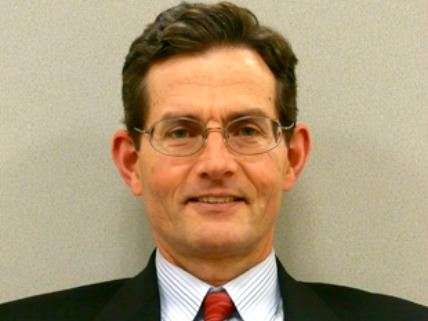Judge Who Imposed a 57-Year Mandatory Minimum Sentence Gets It Reduced to 20

Francois Holloway is less sympathetic than the prisoners typically featured in stories about the injustices wrought by mandatory minimum sentences. He is not a nonviolent drug offender; he is a convicted carjacker. Still, he has already served two decades for his crimes, and he probably would have died behind bars had it not been for the efforts of the federal judge who sentenced him.
Holloway, who was convicted in 1996, got 57 years, more than twice as long as the average sentence for murder that year in the district where he was tried. "Sentencing data suggest that Holloway would have fared much better if he had committed first degree murder instead of robbing three cars," observes U.S. District Judge John Gleeson, who presided over Holloway's trial at the federal courthouse in Brooklyn.
The sentence was dictated mainly by a federal law aimed at criminals who use guns—the same law that sent Weldon Angelos, a nonviolent pot dealer, to prison for 55 years and that would have sent Chris Williams, a Montana medical marijuana grower, to prison for 80 years if prosecutors had not relented after his trial. Holloway was not actually armed during the three carjackings in which he participated, but one of his accomplices was, and that was enough for sentencing purposes. He got five years for the first gun use and 20 years each for the two others, plus 12 for the three carjackings, all to be served consecutively. By contrast, the longest sentence received by his accomplices, all of whom pleaded guilty, was six years. Holloway himself was offered a plea deal that included a recommended sentence of about 11 years. In effect, he got an extra 46 years for exercising his constitutional right to a trial.
Holloway "filed one motion after another trying to get his sentence and his case re-evaluated," The New York Times reports, and last year Gleeson "began his own campaign on Mr. Holloway's behalf," citing "his clean disciplinary record and his participation in prison programs as evidence of his rehabilitation and his prospect of a normal post-prison life." In response to Gleeson's repeated recommendations, Loretta Lynch, the U.S. for the Eastern District of New York, recently agreed to vacate two of the gun charges against Holloway, clearing the way for him to be freed next year (after he serves some time in state prison for a drug offense). Otherwise his release date, allowing for "good time" credit, would have been 2045.
In a May 14 memorandum urging Lynch to reduce the number of gun charges against Holloway, Gleeson said the case illustrates "prosecutors' use of ultraharsh mandatory minimum provisions to annihilate a defendant who dares to go to trial." As I noted in a column last December, the power to invoke such provisions helps explain why 97 percent of federal defendants plead guilty.


Show Comments (35)